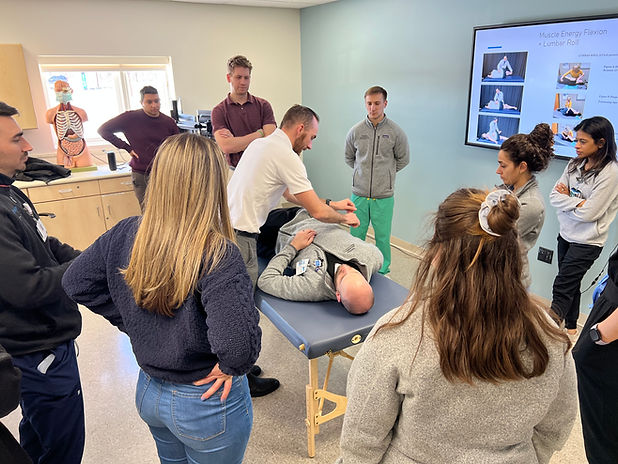
DIDACTIC
CUrriculum
Our residents consistently highlight our didactics as one of the most valuable aspects of their training. Every weekday from Noon to 1:00 PM, we provide protected education time dedicated to enriching learning experiences. This structured and engaging curriculum reflects our commitment to academic excellence and resident success. Explore the wide range of didactic sessions and educational opportunities that make our program a standout in internal medicine training.

Morning Report
Interesting cases are presented by our Chief Residents and Clinician Educator Track residents with a focus on developing a differential diagnosis, clinical reasoning, and patient management as interns and residents work through the cases in a discussion-based format.
Specialty Conference
We welcome our subspecialty faculty to provide engaging sessions to cover clinically high yield and board relevant topics. This includes faculty from the Cardiology, Critical Care, Endocrinology, Gastroenterology, Hematology, Hospital Medicine, Infectious Disease, Nephrology, Oncology, and Pulmonology departments and is based on our three-year rolling curriculum to provide a comprehensive review of content on the American Board of Internal Medicine (ABIM) board examination.


Intern Survival & Transition to Upper Level Series
During the month of July, we provide a focused didactic series for our new interns as they transition from medical student to practicing physician. The goal is to introduce them to the fundamentals of history taking and physical examination, clinical decision making, and efficiency. There are also a series of resident lectures throughout the month that focus on topics related to leading a team as they transition to their role as an upper level.
Simulation Training
The Geisinger Education & Medical Simulation (GEMS) Center was designed to provide learners with an opportunity to further their clinical skills through hands-on and simulation-based training experiences. Our interns and residents spend time at the GEMS Center during the Simulated Rapid Response to Critical Illness Curriculum with Dr. Swinden, Osteopathic Manipulative Medicine Training through the Osteopathic Recognition, Point-of-Care Ultrasound Curriculum, and procedural workshops available throughout the year.


Point-of-Care Ultrasound (POCUS) Workshop Series
The goal of the POCUS curriculum at Geisinger Medical Center is to introduce Internal Medicine residents to the knowledge and theory of ultrasonography, the basics of image acquisition and interpretation skills, and the appropriate integration of POCUS into clinical practice while at the same time outlining its common pitfalls and limitations.
Board Review
Our Board Review program is designed to ensure residents are thoroughly prepared for certification exams. We incorporate gamification into the process, making learning interactive and engaging. Through medical jeopardy, Legends of MKSAP, or Family Feud-style games, residents reinforce their knowledge in a fun and collaborative environment. This dynamic approach not only enhances retention but also builds confidence for the board exams.


OMT & Musculoskeletal
Workshops
Residents have the opportunity to brush up on physical exam maneuvers and hone their diagnostic skills while practicing appropriate hands-on osteopathic manipulative medicine (OMM) training at the GEMS Center. Osteopathic Recognition residents also have the opportunity to participate in journal clubs related to OMM throughout the year, monthly Osteopathic Grand Rounds, and dedicated clinic half days during ambulatory rotations where they can treat patients with OMM and practice their skills under the supervision of one of our DO attendings.
Complex Case Conference
Once per month, our Clinician Educator Track Residents, alongside core sub-specialty faculty, take a deeper dive into a medically complex case that was diagnostically or ethically challenging. The goal is to review and discuss the case in an inter-specialty format to introduce residents to more advanced clinical reasoning skills.


Quality Improvement
During intern year, learners are introduced to the foundations of QI during their ambulatory rotations through a series of didactic sessions. Interns will also complete a personal QI project to reinforce the principles of Quality Improvement throughout the year. Our residents then become more integrated into QI as they are given the opportunity to participate in multi-disciplinary QI projects at the institutional level within Geisinger during the second and third year of residency.
Journal Club
Residents present monthly Journal Club with the goal of developing an approach to critical appraisal of the literature as they work to become stewards in the practice of evidence-based medicine. A new or landmark article is discussed, and the residents work their way through interpreting the article from a clinical viewpoint. Following Journal Club is a brief biostatistics session aimed at teaching residents how to interpret basic biostatistics in bite-sized chunks.


Internal Medicine Ambulatory Curriculum (IMAC)
During ambulatory rotation each morning from 7:50-8:20am residents participate in case-based discussions utilizing Yale’s Office-Based Medicine Curriculum with a focus on common outpatient complaints and diagnoses.
Grand Rounds
Medical Grand Rounds is a key component of our Internal Medicine Residency, featuring weekly educational sessions where residents and faculty discuss cutting-edge research, clinical cases, and advances in medicine. These sessions keep residents current, sharpen their skills, and foster professional growth.


Morbidy & Mortality
One Friday per month is dedicated to Morbidity and Mortality conference. These sessions are resident-led as they review cases in the presence of Internal Medicine and Sub-Specialty faculty. The goal is to review adverse patient outcomes through a root cause analysis in hopes to improve patient care.



